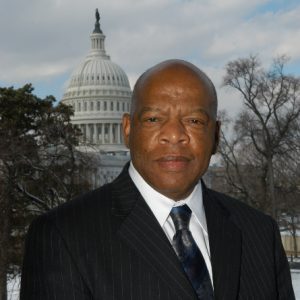As we mourn the loss of U.S. Rep. John Lewis, who died July 17, explore his tremendous life and legacy with these articles. From his work as one of the first Freedom Riders to his speech at the 1963 March on Washington to his service in Congress, Lewis urged Americans to make "good trouble, necessary trouble" to change our country for the better.
You can read these articles using CPL's Online Resources.
"Who Were the Freedom Riders?" by Derrick Bryson Taylor
New York Times, July 18, 2020
In Q&A format, this article explores the origin and legacy of the Freedom Rides. It quotes civil rights historian Raymond Arsenault, author of Freedom Riders: 1961 and the Struggle for Racial Justice, as saying, "He was absolutely fearless and courageous, totally committed. People knew that he always had their back and that they could count on him. He had an incorruptible commitment to nonviolence."
"John Lewis on the March on Washington"
The Washington Post, August 23, 2013
At 23, Lewis was the chairman of the Student Nonviolent Coordinating Committee and the youngest speaker at the 1963 March on Washington. He shared memories of the march in this piece, from the lead-up to the day of the event. "For that crowd to be interracial, it sent a message that this movement was not just about African Americans. It was about all Americans," Lewis said. "To see that presence of blacks and whites, I don't think people had seen that in America before."
"In the Graphic Novel 'March,' Rep. John Lewis Renders a Powerful Civil Rights Memoir" by Michael Cavna
The Washington Post, August 13, 2013
Learn how a comic book inspired Lewis to activism in this profile of Lewis upon the publication of the first book in his award-winning three-part graphic memoir, March. "March digs in with the compelling perspective of someone who lived it—who could see eventual victory even through the beatings and the jailhouse bars," Cavna writes. It puts "you squarely in the bruising maw of a movement."
"'They Didn’t Just Love Him. They Knew Him.' Young Atlanta Activists Mourn John Lewis" by Rick Rojas
New York Times, July 18, 2020
See Lewis from the perspective of those he represented in Atlanta, where he was often out and about. "He was unbelievably brave and he was willing to keep working on things even if it didn’t seem possible to win," said Jasmine Amussen, an editor of Burnaway, a magazine focused on arts and activism in the South. "Whereas now, people only want to get involved in things they can win. But he was willing to do the day in, day out, grinding it out work that has to be done."
"What Can John Lewis Teach Us Right Now?" by Lane Florsheim
Wall Street Journal, July 2, 2020
Read an interview with the filmmakers behind the recently released documentary John Lewis: Good Trouble. Director-producer Dawn Porter says, "The thing I'm proudest of is that I know that he's seen what we see, that he's seen why people are so emotional about his service to the country. Because it really is such a life," while producer Erika Alexander says, "He's one of the founding fathers of America as far as I'm concerned."



Add a comment to: 5 Articles: ‘Courageous, Totally Committed’ John Lewis